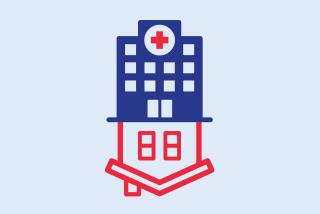Reynolds Scion Taking Role in Prop. 99’s Anti-Tobacco Drive
Scrambling to keep a lead in the opinion polls, sponsors of Proposition 99, the tobacco tax initiative, are covering the state with low-cost, high-profile events, including a public endorsement by the grandson of tobacco pioneer R. J. Reynolds.
Anti-smoking activist Patrick Reynolds’ Yes on 99 plea highlights a week of unusually vibrant campaigning by supporters of the 25-cents-a-pack increase--a week in which debates, a “health run” and a Halloween skit for children also are being used to counter TV ads eating away at the proposition’s popularity.
Meanwhile, tobacco interests are going beyond their negative ads and are trying to directly rebut the medical community’s campaign. For example, it mocked the anti-smoking skit by giving out bags of candy that said, “The real trick is the multimillion-dollar treat doctors have written for themselves.”
Despite the new campaign vigor, campaign themes for both sides are the same.
Doctors say the first tobacco-tax boost in 21 years would discourage smoking and raise money for indigent health care and tobacco-related disease research. Tobacco interests contend that the increase would be unfair to smokers, a burden on the poor and a windfall for wealthy doctors who are paid to treat the poor.
Proposition 99 would increase California’s state tobacco tax, now among the nation’s lowest, to 35 cents a pack and then use the money to help provide health care for uninsured indigents, fund anti-smoking education programs, finance research into tobacco-related diseases and improve public parks.
The proposal was supported by 72% of those queried by the California Poll in July, but last week the poll found support had dipped to 51%, with 30% opposed and 19% undecided. The Los Angeles Times Poll released Wednesday found that 58% of voters support the measure, 36% oppose it and 6% are undecided.
Controversial Ads
Tobacco interests have sought to whittle down support for the proposal with a series of controversial TV ads alleging that the measure would increase crime and enrich doctors. The medical community denies the charges, but it has less than one-tenth of the tobacco industry’s $10-million advertising budget, so doctors have turned to grass-roots campaigning instead.
Pro-99 events this week range from a debate Monday in San Diego to a caravan down Highway 99 in the Central Valley on Tuesday and Wednesday to a “Walk-and-Fun Run” on Sunday in Long Beach. Today’s schedule includes debates in Orange and San Mateo counties and press conferences at both ends of the state announcing Reynolds’ endorsement.
Important Symbol
Reynolds, 39, of Beverly Hills has become a powerful symbol to anti-smoking forces since he first stepped forward in 1986 to support a proposed ban of all tobacco advertising. Congress ultimately rejected the idea, but the experience persuaded Reynolds, an ex-smoker himself, to leave acting and instead campaign against smoking, as well as writing a book about his wealthy and well-known family.
“I thought people would listen to me, but I didn’t expect to be on Dan Rather that night,” Reynolds recalled. “I realized in the ensuing weeks and months that I could have an impact.”
His distaste for smoking is not difficult to understand, he said. His first memory of his father, R. J. Reynolds Jr., is of him lying down with sandbags on his chest to exercise his impaired lungs.
Lung Disease
“My father (a lifelong heavy smoker) died of emphysema caused by the very product that made our family fortune,” he said. “I didn’t know my father all that well, because he died when I was still a boy. To learn more about him, I began researching the family and the company.”
And, he added, the way in which the company made its money.
“The more I learned, the more concerned I became,” he said, adding that he believes the ad campaign against Proposition 99 typifies the industry’s use of misinformation.
“Out of one side of their mouths, they say, ‘Oh, this will hurt low-income people,’ but at the same time, they have been raising their prices 300% (since the last tax increase in 1967),” he said.
Support for Doctors
He also criticized the tobacco industry’s implication that doctors support the measure chiefly to benefit themselves.
“Doctors don’t get rich treating the poor,” he contended.
In any case, after researching his family, Reynolds resolved not only to quit smoking, but also to sell the company stock he inherited. He said he did not own a single share of stock in what is now RJR Nabisco Inc. between 1979 and 1986, when a brother teasingly bought him two shares as a Christmas present.
Reynolds said he will donate both those shares to the Yes on 99 campaign at the press conference scheduled for today.
Officials at the tobacco industry-financed campaign opposing the initiative were unimpressed with the symbolism.
“The guy has spent his whole life doing this (working against smoking),” No on 99 spokesman Jeff Raimundo said. “We probably don’t even have a comment, except to note he has not turned back any of the money (from his inheritance).”
Reynolds shrugs off such criticism.
“I’ve really been able to make a difference with my life in this arena,” he said, “and it feels great.”
More to Read
Get the L.A. Times Politics newsletter
Deeply reported insights into legislation, politics and policy from Sacramento, Washington and beyond. In your inbox three times per week.
You may occasionally receive promotional content from the Los Angeles Times.










